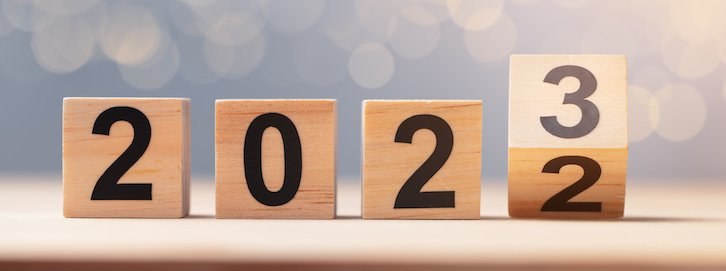This week's Economist/YouGov poll asked Americans to reflect on the past year and on what lies ahead. While most Americans look back on 2022 as a bad year — both for the country and for themselves — this is an improvement over how many viewed 2021 and 2020 the same way when asked at the end of each of those years. Opinions on the country's progress in 2022 vary depending on what is asked about. While Americans' assessments of the past year are better now than they were of 2021 or 2020 on some fronts — education, job security, and health care — more see the country as worse off compared to the year prior in many economic domains, including the national economy, the local economy, the U.S. financial system, and Wall Street.
Nearly three years ago, the U.S. first faced the COVID-19 pandemic. Looking back on 2020 and 2021 as each year was ending, overwhelming shares of Americans saw each of them as bad years for the world, and most saw them as bad years for themselves and their families. Evaluations have improved this year, though not by all that much. When it comes to looking ahead, Americans are divided about the year ahead for the world — as they have been in past years — and cautiously optimistic about the year ahead for their families.
Many Americans expect 2023 to be a hard one economically even as the COVID-19 pandemic recedes.
Most people say that the U.S. is now in a recession — which has been a majority opinion since the summer — and while the share saying the economy is getting worse has dropped from a high of 65% in late June, 47% still see things getting worse. The economy is a problem for many Americans. Half believe their family has been affected “a lot” by inflation. And difficulties on Wall Street have added to economic concerns.
Looking back on 2022, 49% see it as having been a worse year for Wall Street than 2021. After 2020, when the S&P 500 index fell 12% on a single March day but finished the year up 27%, just 26% described Wall Street as having had a worse year than the year before. Looking ahead, more Americans are negative than positive about the stock market, with 33% saying things will get worse for Wall Street and just 21% saying they'll get better. On a host of other economic issues, many Americans say 2022 was worse than the year before — in line with assessments of the two prior years in polls as each year ended. And more people expect things to get worse than better in 2023 for these economic issues.
The poll also asked Americans to forecast the future historical reputation of the four most recent U.S. presidents: Joe Biden, Donald Trump, Barack Obama, and George W. Bush. Of these, Biden and Trump are seen as having the worst legacies, with nearly half of people — 46% and 48%, respectively — saying each will go down as below-average or poor presidents. Just 22% say Biden will go down as above average or outstanding while 30% say this about Trump.
Obama fares the best, with only one in four (26%) saying he will go down in history as a below-average or poor president and 43% saying he will go down as above average or outstanding. George W. Bush is most likely to be described as an average president (37% say this), while 30% say he will go down in history as below average or poor and 20% say he will go down as above average or outstanding.
— Carl Bialik and Linley Sanders contributed to this article
See the toplines and crosstabs from the Economist/YouGov poll conducted on December 31, 2022 - January 3, 2023 among 1,500 U.S. adult citizens.
Methodology: Respondents were selected from YouGov’s opt-in panel using sample matching. A random sample (stratified by gender, age, race, education, geographic region, and voter registration) was selected from the 2019 American Community Survey. The sample was weighted according to gender, age, race, education, 2020 election turnout and presidential vote, baseline party identification, and current voter registration status. Demographic weighting targets come from the 2019 American Community Survey. Baseline party identification is the respondent’s most recent answer given prior to June 1, 2022, and is weighted to the estimated distribution at that time (34% Democratic, 31% Republican). The margin of error for the overall sample is approximately 3%.
Image: Adobe Stock (Li Ding)













